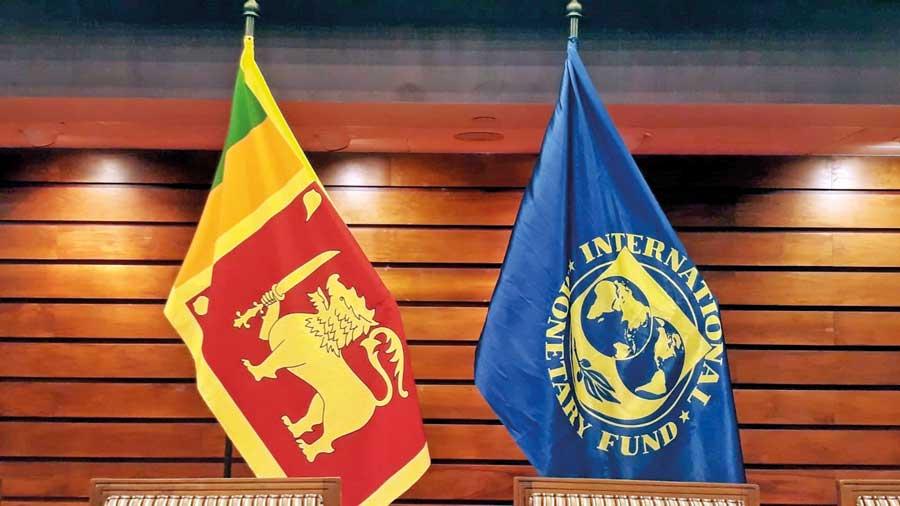24 Apr 2024 - {{hitsCtrl.values.hits}}

When compared to other countries, Sri Lanka’s International Monetary Fund (IMF) programme is lenient in my opinion. Even if the 17th IMF programme is implemented, it may not be enough, so there is very little space to make changes to the broader programme targets.
opinion. Even if the 17th IMF programme is implemented, it may not be enough, so there is very little space to make changes to the broader programme targets.
The three broad targets of Sri Lanka’s 17th IMF programme:
1. Achieve a primary budget surplus of 2.3 percent by 2025 and beyond.
2. Bring annual foreign currency debt service from 9.4 percent of gross domestic product (GDP) in 2022 to 4.5 percent of GDP during 2027-2032. Reduce the government’s gross financial needs, which was at 35 percent of GDP in 2022, down to below 13 percent from 2027-2032.
3. Public debt, which was 128 percent to GDP, should be reduced to 95 percent by 2032.
Any negotiations of the IMF programme will have to alter at least one of the above three broader targets. I will go through them one by one.
Target 1 – Primary budget surplus of 2.3 percent by 2025 and beyond
Sri Lanka has just achieved a primary budget surplus of 1.2 percent for the year 2023, which means, excluding the interest payments, we have recorded a fiscal surplus of 1.2 percent. But the budget deficit for 2023 was 7.1 percent of GDP, which is quite high.
As the government is shut out of international capital markets and cannot print money with the New Central Bank Act taking effect, the government borrows from the domestic market along with multilateral funds. When Sri Lanka’s debt is over 100 percent of GDP and the government revenue-to-GDP is one of the lowest in the world (around 8 percent in 2022), running a 7 percent budget deficit is not sustainable. Even if Sri Lanka was to have achieved the primary budget surplus of 2.3 percent in 2023, we would still have had a 6 percent budget deficit, which is still unsustainable.
By trying to renegotiate with the IMF to make the first target of achieving a primary budget surplus of 2.3 percent more lenient, the Sri Lankan government is basically trying to renegotiate with the IMF to allow Sri Lanka to have a larger budget deficit. When the current budget deficit of 7.1 (2023) itself is unsustainable, a large fiscal deficit is unsustainable and will only cause long-term damage to Sri Lanka by increasing Sri Lanka’s debt burden.
Target 2 – External debt servicing to 4.5 percent of GDP for 2027-2032
In 2022, the external debt servicing was 9.4 percent of GDP, which is not sustainable. The IMF target is to bring it down to 4.5 percent. Sri Lanka’s external debt is over US $ 50 billion. External debt servicing will have to be brought down to the IMF given targets for Sri Lanka to have a chance of sustaining its economy.
Since Sri Lanka defaulted in 2022, Sri Lanka is not paying any foreign debt (except multilateral debt) and has banned importing vehicles but still its current account balance is estimated to be barely positive at 1.5 percent (according to the IMF country report December 2023).
Yet again, Sri Lanka has almost no room to renegotiate the IMF programme here. External debt has to be negotiated well and we need to cut down foreign currency borrowing while paying off the external debt to bring the external debt servicing down. This will require closing the trade deficit.
Sri Lanka’s current account deficit was 5.4 percent of GDP for 2023, even when debt repayments to the bilaterals and bondholders are suspended. Trying to renegotiate this target will only damage Sri Lanka in
the long term.
SRI LANKA TRYING TO NEGOTIATE WITH THE IMF WOULD BE LIKE A PATIENT IN CRITICAL CONDITION IN THE INTENSIVE CARE UNIT OF A HOSPITAL TRYING TO NEGOTIATE WITH THE SURGEON TO LIGHTEN
THE TREATMENT
Target 3 – Government debt to 95 percent by 2032
When Sri Lanka defaulted in 2022, its debt-to-GDP was at 128 percent. Even if we successfully complete the IMF programme, our debt is only expected to come down to 95 percent of GDP by 2032. Ghana declared bankruptcy when its debt-to-GDP was only around 92 percent. So, even if we successfully complete the IMF programme, our debt-to-GDP ratio will still be worse than the debt level at which Ghana defaulted.
Let me repeat, so it is clear. So, we are trying our best through the IMF programme, so that eight years later, we can get to a level of debt-to-GDP, which would still be worse than at which Ghana defaulted.
The other part is that when Ghana defaulted with its debt at around 92 percent of GDP, its government revenue-to-GDP was 14 percent. Sri Lanka’s was at less than 8 percent when it defaulted. Yet, the IMF was much harsher on Ghana than it has been on Sri Lanka.
Is there space to renegotiate IMF programme?
Where are we going to make the changes, if we are to negotiate the IMF programme? Do we renegotiate the IMF programme to make things easier in the short term, which will result in our debt-to-GDP level being over 95 percent in 2032? Remember Ghana defaulted at around 92 percent of debt-to-GDP only. If that is the case, Sri Lanka would be walking straight into a second default.
A second default will have much darker consequences than the first default. In a second default, the debt negotiations with the bilaterals (China, Japan and India) and bondholders will be much tougher, as they will demand tougher reforms. If renegotiating the IMF deal, results in Sri Lanka defaulting the IMF conditions will also get tougher, as the debt sustainability targets would have moved.
Also, the people of Sri Lanka will not have even the little buffer they had to withstand another round of more severe austerity. Of course, we can negotiate with the IMF for smaller changes in the details of this IMF programme but nothing big can be renegotiated, as there is no space for change. Once again to reiterate, even if we complete this IMF programme, we are expected to bring down the debt-to-GDP down to 95 percent, which is still worse than the debt level at which Ghana defaulted at only around 92 percent of debt to GDP.
So, I do not see any space to make large and meaningful changes to the current IMF programme by a future government, though the way the targets are to be achieved at the smaller level can be renegotiated. Sri Lanka trying to negotiate with the IMF would be like a patient in critical condition in the intensive care unit of a hospital trying to negotiate with the surgeon to lighten the treatment. If the surgeon does so, it is the patient’s life that is at greater risk. If Sri Lanka still goes ahead and tries to renegotiate better terms with the IMF for the short-term benefit, at the expense of the long term, we could well be heading towards a second default.
(Talal Rafi is an Economist. He is currently a Consultant on economic policy for a global multilateral development bank. He is an expert member of the World Economic Forum and he is a regular columnist for the International Monetary Fund on public finance management. He was a member of the Deloitte Global Economist Network. The views expressed in this article are strictly the author’s own personal opinions)
04 May 2024 1 hours ago
04 May 2024 2 hours ago
04 May 2024 3 hours ago
04 May 2024 6 hours ago
04 May 2024 7 hours ago